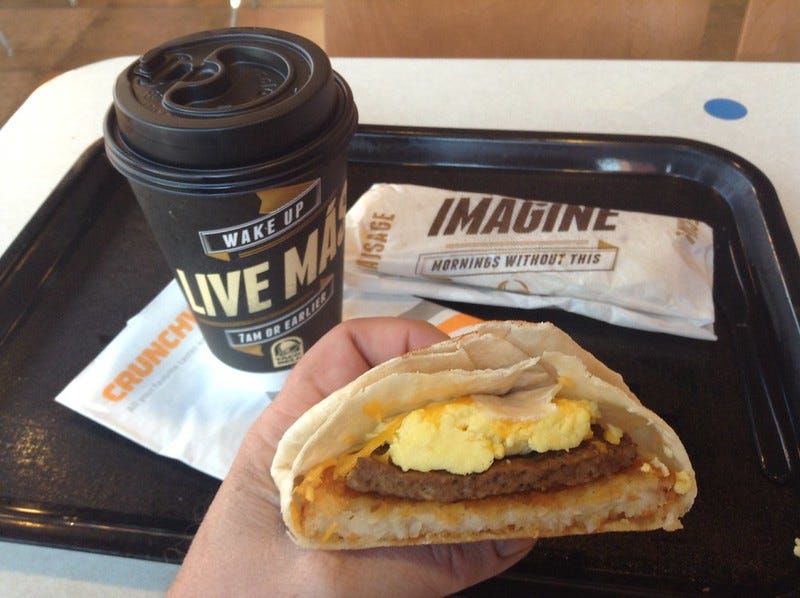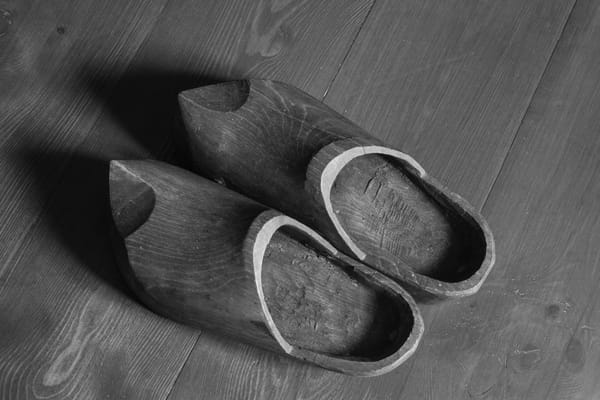What's Good
Weekly roundup of the news about food and fitness technologies: featuring continuous glucose monitors, Eliud Kipchoge, Taco Bell, and more
You know that creepy sensation that your phone is listening to you: when you mention something in passing and then, hours later, all the ads you're served online seem to pertain to that conversation? I had the opposite experience this past week: a product mentioned online, and hour later, several people I was with IRL were touting its benefits.
The product in question was a continuous glucose monitor — precisely the sort of fitness technology that I plan to write about here on Second Breakfast, but one that I've done no research into at all. Kin mentioned it just as I was about to head out the door for my regular Friday "donut run." Someone he followed on Twitter had just inserted hers — and it didn't hurt at all, she boasted. I said that my weightlifting coach had mentioned that one of her clients had also got one as she often felt like she had low blood sugar in the afternoons. ("Just eat a snack?" Coach had suggested.) After the group I run with finished our lap around Lake Merritt and jogged over to Happy Donuts, one of the women commented that she'd inserted a continuous glucose monitor the night before. Two other runners also had the implants. And reader, I was sort of shocked. It's not that the running community is immune to this sort of bio-tracking and bio-hacking behavior. But I still wasn't expecting so see such a sizable uptake of the device, particularly among the endurance running crowd — that is, among athletes who rely on their glycogen stores and then, when those are depleted, on carbs they consume during their long runs. That is to say, hyperglycemia — typically the reason these devices are prescribed medically — isn't necessarily the problem that runners face. (That'd be hypoglycemia — the dreaded "bonking.") And my peers who run around the lake and then go for a donut every Friday didn't seem to me at least to be a group that'd be particularly concerned about “too much sugar.”
But then again, that's the dominant story lately, isn't it: we are all eating “too much sugar,” and — thanks diet culture! — it's making us fat. Maintenance Phase discussed "The Trouble with Sugar" in their latest podcast — spoiler alert: sugar does not make children hyperactive; it is not addictive; a low-sugar diet doesn't necessarily lead to weight loss; and the glycemic index is not a useful measure for how an individual food item will affect one's blood sugar. For people who are diabetic, of course, monitoring blood sugar is essential; but for those who aren't, there isn't any evidence that the practice is worthwhile. Barbell Medicine address all this — the use of continuous glucose monitors for those with diabetes and for athletes — on their latest podcast.
I should note here that I totally get the urge to adopt these sorts of technologies; as an athlete, I am guilty of some of this myself — this notion that all these metrics that new technologies offer are meaningful and that if we just tracked more of them, we could improve our health and performance. But we must also consider technologies like continuous glucose monitors in the larger context of our very broken health care system: one where many people with diabetes cannot afford insulin, let alone these new gadgets; one where money flows into products for the affluent rather than healthcare for the poor; one where research and funding flow into certain areas — of which diabetes is surely one of them (this op-ed in The NYT on the state of transplantation was gut-wrenching); one where all of this — continuous glucose monitoring etc etc — is an expression of our ideology of "health," an ideology that privileges "individual responsibility" rather than collective action and care.
Anyway, now that Kin and I have talked about these devices, his Facebook ads are full of continuous glucose monitors. Publishing this newsletter will surely make things worse.
Elsewhere in sugar news: the history of the bear-shaped honey bottle. Nestle is making Kit Kat cereal. And in other cereal news: Post is suing the band OK Go! for trademark infringement as the former is launching a new cereal called OK Go — a cereal that apparently doesn't need milk with a name created by a marketing department that has apparently never used YouTube before. It's a "legal nightmare," says Rolling Stone. It’s a dietary nightmare, suggests the band’s lead singer.
In other news about things you may or may not want to eat: "Mountain rescuers called to save hikers on magic mushrooms." That said, psychedelics are also apparently the "next big addiction treatment," so there's that — and with all the recent news articles urging us to get out in nature and walk more for the sake of our physical and mental health, perhaps the combination — mushrooms + hiking — is simply perfect. In news about things you should want to eat: "Rolex (an Egg Wrap, Not a Watch) Is the Breakfast to Change Your Mornings." "A short history of the long fight over breakfast tacos." Speaking of tacos, this article in The New Yorker on Taco Bell — "Taco Bell’s Innovation Kitchen, the Front Line in the Stunt-Food Wars" — is definitely worth the read if you, like me, are fascinated by that intersection of food history, food futurism, and pseudo-guacamole. I'll always recommend Tim Carmody’s writing about Amazon (particularly, in this case, on the future of grocery shopping). Elsewhere, on the history of the future of food technology: Karima Moyer-Nocchi talks (in part) about the nostalgia online for nonnas' pasta.

Meanwhile, Eliud Kipchoge did not win the Boston Marathon on Monday. He's still the GOAT in my book and still just incredibly fast. In other running + technology news: "A 50-Mile Race, a Quick Car Ride and a Scandal at the Finish Line." Oooops. In other health + technology news: CoolSculpting seems bad. Weight Watchers is bad, and it is going from bad to worse. I guess we're over Peloton now — or The NYT is, at least. And Virginia Sole-Smith, whose book Fat Talk is out next week, asks "Does My Kid Need a Fitness Tracker?" Betteridge’s Law of Headlines tells us the answer to that question, eh?
May we all learn to love and trust our bodies and not outsource our self-discovery and self-knowledge to a machine.
Yours in struggle,
~Audrey





